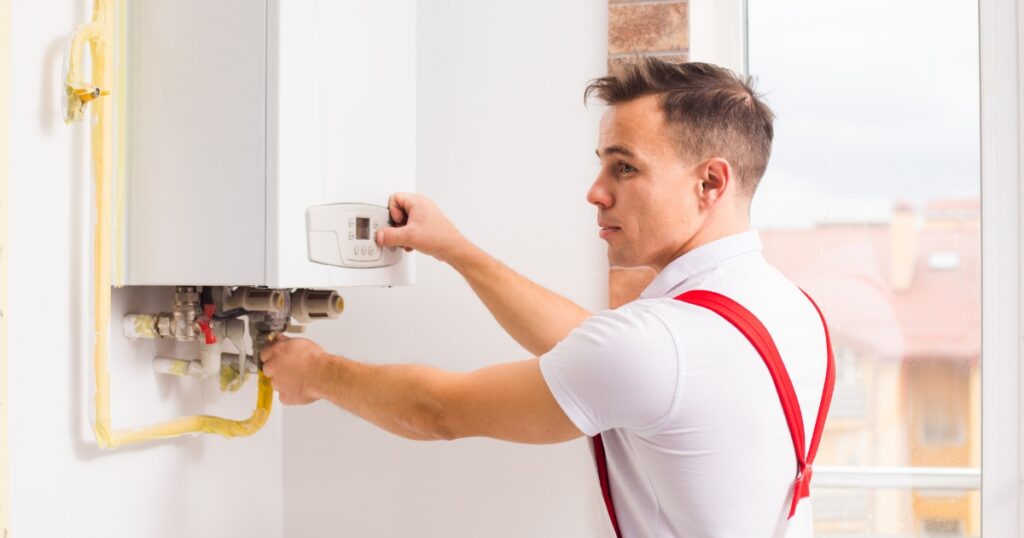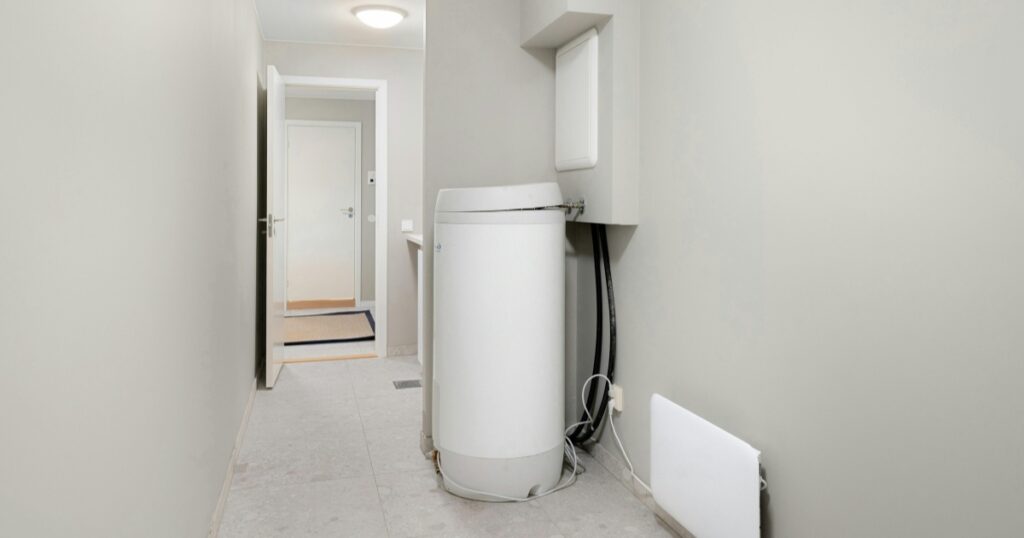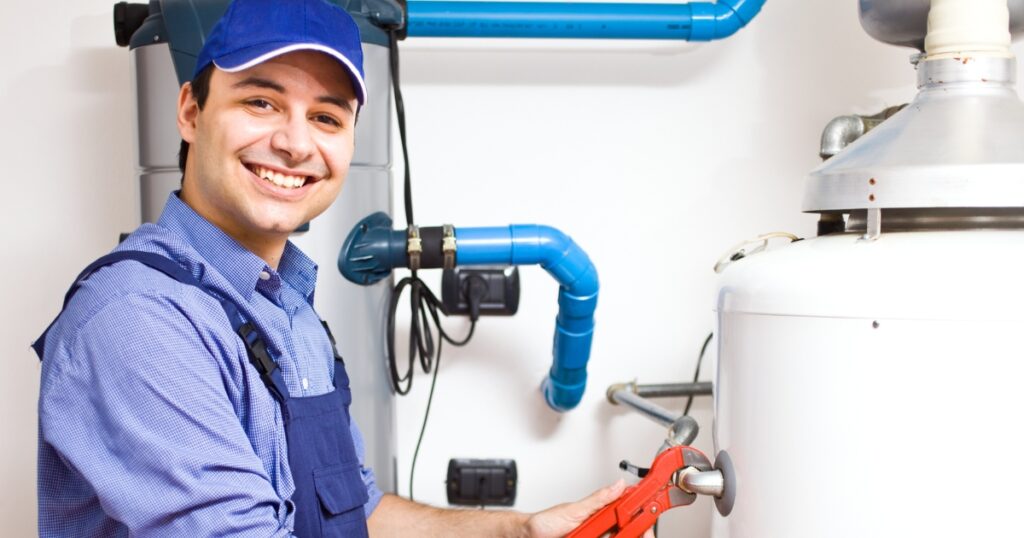G’day! You know, there’s not much worse than a quiet evening being interrupted by your hot water system having a bit of a song and dance, right? We’ve felt the frustration too, mate.
Dealing with an unexpectedly noisy water heater can throw you for six. But don’t worry! We’ve done some hard yards researching just for you – we’ll walk you through common causes of these uninvited racket-makers and give you some fair dinkum troubleshooting tips to nip them in the bud.
Stick around – this article is just what your peaceful nights have been crying out for!
Key Takeaways
- Identifying the source of the noises in your hot water system is important for troubleshooting.
- Sediment buildup, loose parts, faulty heat traps, and water hammering are common causes of noisy hot water systems.
- Troubleshooting tips include turning off the main water valve, draining and cleaning pipes to remove sediment, tightening loose elements, checking for damaged pipes, and seeking professional help if necessary.
Identifying the Source of the Noises
To troubleshoot the noisy hot water system, it is important to identify the source of the noises. These can include rumbling, popping, sizzling, hissing or crackling sounds, ticking noises, screeching, screaming or singing sounds, and banging or hammering noises.

Rumbling
Rumbling noises in your hot water system often point to sediment build-up inside the tank.
Over time, minerals precipitate out of the water and accumulate at the bottom, creating a layer that disrupts normal heating.
As the water heats over this hardened layer, it results in irregular bubble formation and release, generating rumbling sounds. Drain and thoroughly clean your tank as an initial step to silence these disturbing sounds.
If you notice no change post-cleaning or if the noise intensifies, we recommend contacting professional hot water repair services immediately to prevent more significant problems down the line.
Popping
Popping noises in your hot water system can be concerning, but they are often caused by sediment build-up in the tank. As the water heats up, the trapped air bubbles in the sediment can create these popping sounds.
To address this issue, it is recommended to drain and clean your hot water system to remove any accumulated sediment. This will help eliminate the popping noises and ensure that your hot water system functions properly.
If you’re unsure about performing this task yourself, it’s best to seek professional assistance from a qualified plumber who specialises in hot water system repair.
Sizzling, hissing, or crackling
If you notice sizzling, hissing, or crackling sounds coming from your hot water system, it could be a sign of a serious issue. These noises are often caused by sediment buildup in the tank.
As the water heats up, the sediment can create steam pockets that make these sounds. It’s important to address this problem promptly, as excessive sediment can lead to reduced efficiency and even damage to your hot water system.
To resolve this issue, it is recommended to drain and clean the tank thoroughly to remove any sediment buildup. Calling a professional plumber for assistance may also be necessary if the problem persists or if you’re unsure how to properly clean your hot water system.
Ticking
If you hear a ticking sound coming from your hot water system, it could be a sign of loose components or faulty valves. This noise may occur when the heat traps in the pipes are not functioning properly, causing water to flow irregularly and create ticking sounds as it passes through.
Another possible cause is loose mounting brackets or screws on the tank, which can vibrate and produce ticking noises. To address this issue, you can try tightening any loose parts or contacting a professional plumber to inspect and repair the problem.
Screeching, screaming, or singing
If you’re hearing screeching, screaming, or singing sounds coming from your hot water system, it could be a sign of a serious issue. These high-pitched noises may indicate that there is excessive pressure building up within the system.
This can be caused by a faulty pressure relief valve or an over-pressurised tank. It’s important to address this problem promptly as it could lead to leaks or even explosions. Contacting a professional plumber is recommended to inspect and repair your hot water system to ensure its safe operation and prevent further damage.
Banging or hammering
If you’re hearing a loud banging or hammering sound coming from your hot water system, it could be due to a phenomenon known as water hammer. A water hammer occurs when the flow of water is suddenly stopped or redirected, causing a shockwave through the pipes.
This can happen when a valve closes too quickly or if there are loose pipes that vibrate against each other. To fix this issue, you can install water hammer arrestors, which are devices that absorb the shock and prevent the noisy banging sound.
Another solution is to secure any loose pipes with pipe hangers or insulation to minimise movement and vibrations. Seeking help from a professional plumber may also be necessary if the problem persists.
Causes of Noisy Hot Water Systems
- Sediment buildup in the water tank can cause noises such as rumbling and popping, as the sediment gets heated and creates steam bubbles.
- Water hammering, which occurs when water flow is suddenly stopped or redirected, can result in banging or hammering sounds in the pipes.
- Loose parts within the hot water system, such as valves or fittings, can vibrate and create ticking noises.
- Faulty heat traps that are not functioning properly can lead to sizzling, hissing, or crackling sounds.
Sediment buildup
One common reason for a noisy hot water system is sediment buildup in the tank. Over time, minerals and debris can collect at the bottom of the tank, causing popping, banging, and rumbling noises when the heater is running.
This sediment acts as an insulator, making it harder for the heat to transfer efficiently and potentially overheating certain parts of the tank. To address this issue, it is recommended to drain and clean the hot water system on a regular basis to clear away any sediment build-up.
This will help prevent further damage to your system and ensure that it operates quietly and efficiently.
Water hammering
Water hammering can be a common cause of noisy hot water systems. This occurs when there is a sudden change in water flow or pressure, causing the pipes to rattle and shake. It can be quite loud and disruptive, especially if it happens frequently.
Water hammering is often caused by loose pipes or valves that need to be tightened. To fix this issue, you should check your pipes for any signs of damage or looseness and tighten them accordingly.
If the problem persists, it may be necessary to call a professional plumber who can help determine the root cause and provide appropriate solutions.
Loose parts
If you notice strange noises coming from your hot water system, loose parts could be the culprit. Metal components in the system can become loose over time and cause banging or hammering sounds.
These noises occur when the metal expands and contracts during heating cycles. While some degree of noise is normal, excessive banging or hammering may indicate a problem with loose parts.
To fix this issue, it is recommended to tighten any loose elements in your hot water system. This can help prevent further damage and ensure optimal performance.
It’s important to address these noisy hot water systems promptly as they can be a sign of underlying issues. Seeking professional assistance from a plumber may be necessary if tightening the parts doesn’t resolve the problem entirely.
Faulty heat traps
If you’re hearing strange noises coming from your hot water system, a faulty heat trap could be the culprit. Heat traps are valves that prevent the hot and cold water in your system from mixing together.
Over time, these valves can become worn or damaged, causing them to malfunction. This can result in clicking or ticking noises in your hot water system. To fix this issue, it is best to call a professional plumber who can inspect and replace the faulty heat trap if necessary.
Don’t ignore these noises as they may indicate a larger problem with your hot water system.

Troubleshooting Tips
- Turn off the main water valve to prevent any further damage to your hot water
- Refill and drain pipes to remove any sediment or debris that may be causing the noise.
- Tighten loose elements, such as valves or fittings, which can create vibrations and noise when they are not securely fastened.
- Check for damaged pipes that may need to be replaced if they are causing the noise.
- If all else fails, it’s best to call a professional plumber who can diagnose and fix the issue with your hot water system.
Turn off the main water valve
To address strange noises in your hot water system, one of the first troubleshooting steps you can take is to turn off the main water valve. This will cut off the water supply to your system and allow you to inspect it more closely without the risk of any further damage or leaks.
By turning off the main water valve, you can also prevent any potential accidents or injuries while examining the system. Once you have turned off the valve, you can proceed with other troubleshooting tips to identify and fix the issue causing the noise in your hot water system.
Refill and drain pipes
To address noisy hot water systems, one troubleshooting tip is to refill and drain the pipes. Sediment buildup in the tank can cause popping, banging, and rumbling noises. By draining the hot water system and cleaning it thoroughly, you can clear out any sediment that may be causing these disruptive sounds.
This maintenance task helps to ensure smooth water flow and prevent further issues with your hot water system. Seek professional assistance if needed for a thorough cleaning and inspection of your pipes to keep your hot water running quietly and efficiently.
Regularly refilling and draining pipes is a simple yet effective way to maintain your hot water system’s performance. It prevents sediment accumulation that could lead to noisy operations while also prolonging the lifespan of your system.
Tightening loose elements
One possible cause of noise in your hot water system is loose elements. Over time, vibrations can cause various components, such as heating elements and pipes, to become loose. When these elements are not securely fastened, they can rattle or vibrate, creating irritating noises.
To address this issue, it is important to tighten any loose elements in your system. Check the connections of the heating elements and ensure they are firmly attached. Additionally, inspect the pipes for any signs of looseness and secure them if necessary.
By tightening these loose elements, you can reduce or eliminate the unnecessary sounds coming from your hot water system.
Check for damaged pipes
We need to check for any damaged pipes in our hot water system. Damaged pipes can cause strange noises, such as hissing or screeching sounds. They can also lead to leaks, reduced water pressure, and potential water damage.
To inspect the pipes, visually examine them for any visible cracks, loose fittings, or signs of corrosion. Pay attention to areas where two pipes are connected or where they pass through walls or floors.
If you notice any damage, it is essential to repair or replace the affected pipe promptly to prevent further issues and maintain a quiet and efficient hot water system.
Call a professional plumber
If you’re experiencing persistent and loud noises from your hot water system, it’s time to call a professional plumber. While there are troubleshooting tips that you can try on your own, such as draining the tank or tightening loose elements, a noisy hot water system can often be a sign of more serious issues.
A professional plumber will have the expertise and tools needed to diagnose and fix the problem properly. Don’t wait until the noise becomes unbearable or leads to further damage; contact a professional plumber for assistance with your noisy hot water system.
Preventing Noisy Hot Water Systems
To prevent noisy hot water systems, regular maintenance is essential. Flushing the tank regularly helps to remove sediment buildup that can contribute to noise. Additionally, insulating the pipes can reduce vibration and minimize sound transmission.
By taking these preventative measures, homeowners can ensure a quieter and more efficient hot water system for years to come.
Regular maintenance
Regular maintenance is essential for keeping your hot water system running smoothly and preventing noisy issues. By performing routine maintenance tasks, such as flushing the tank and checking for sediment buildup, you can avoid costly repairs and extend the lifespan of your system.
Insulating pipes can also help reduce noise caused by expanding and contracting metal parts. Stay on top of regular maintenance to ensure a quiet and efficient hot water system that meets all your household needs.
Flushing the tank
Flushing the tank is an important step in addressing a noisy hot water system. Sediment buildup in the tank can cause popping, banging, and rumbling noises. Flushing the tank involves draining and cleaning it to remove any sediment that has accumulated over time.
This helps to eliminate the source of the noise and improve the overall performance of your hot water system. It is recommended to seek professional hot water repair services for this task as they have the expertise to properly flush your tank and ensure optimal functioning.
Insulation of pipes
Insulating your hot water system pipes can help reduce noise and improve energy efficiency. By adding insulation, you can prevent heat loss in the pipes, which means your hot water system won’t have to work as hard to maintain temperature.
This can also help reduce the sound of water flowing through the pipes, minimizing any banging or ticking noises. Insulation sleeves or foam pipe wraps are easy to install and can be found at most hardware stores.
Taking this simple step can make a big difference in keeping your hot water system running smoothly and quietly.
Check Out These Troubleshooting Tips
In conclusion, addressing and fixing noisy hot water systems can be done through troubleshooting tips such as draining and cleaning the tank to remove sediment build-up, tightening loose elements, and checking for damaged pipes.
Regular maintenance, including flushing the tank and insulating pipes, can help prevent future noise issues. If in doubt or if the noises persist, it is best to call a professional plumber for further assistance.






